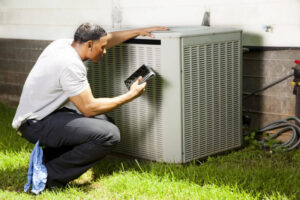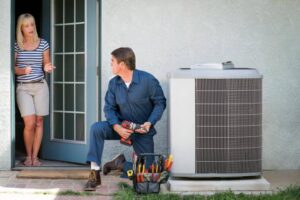Air Temperature Control Systems, Inc.
Conquer the Heat: DIY Air Conditioner Maintenance vs. Calling the Pros

The Essential AC Maintenance Guide For Homeowners
Staying comfortable indoors often relies on a hero we don’t always appreciate: our air conditioner. In today’s world, efficient HVAC systems are essential for any home or business. They banish discomfort and create a clean, refreshing environment.
But just like any hero, your AC needs a sidekick – regular maintenance. Neglecting your air conditioner can lead to costly breakdowns and leave you sweating through a summer nightmare. This guide empowers you to take charge of your AC’s well-being. We’ll explore what maintenance tasks you can tackle yourself and when to call in the professionals.
DIY Maintenance: Keeping Your AC Fighting Fit

Preventative maintenance is key to ensuring your AC operates smoothly for years to come. Think of it like giving your car a regular tune-up. By taking proactive steps, you can avoid major problems and costly repairs down the road.
Here’s what you can do yourself:
• Change the Air Filter: A clogged filter restricts airflow, forcing your AC to work harder and reducing efficiency. Check your filter monthly and replace it according to the manufacturer’s recommendations (typically every 1-3 months).
• Clean the Outdoor Unit: Clear away leaves, debris, and overgrown vegetation from around the condenser unit outside. This ensures proper airflow and heat exchange. Use a garden hose with a gentle spray to remove dust and grime, but avoid directly hitting the fins.
• Inspect Ducts (Optional): Visible dust buildup around vents or registers might indicate leaky ducts. Sealing leaks can improve efficiency, but this task can be messy and require specialized tools. Consider consulting a professional for duct cleaning.
Calling in the Cavalry: When to Hire an HVAC Technician
While some maintenance tasks are DIY-friendly, some situations require professional intervention:
• Complex Repairs: If your AC isn’t cooling properly, makes strange noises, or leaks refrigerant, it’s time to call a technician. These issues often point to problems with electrical components or refrigerant leaks, which require trained professionals to fix.
• Annual Tune-Up: Schedule a professional tune-up for your AC at least once a year, ideally before the peak summer season. A technician can perform a thorough inspection, clean internal components, and ensure your system is operating at optimal efficiency.
Chapter 1
Optimizing Your HVAC System for Peak Performance
A well-maintained HVAC system is a champion of comfort, ensuring your commercial or residential space stays cool in summer and warm in winter. But with various components and complexities, crafting an effective maintenance plan can feel daunting.
This guide empowers you to create a winning strategy, taking into account key factors to keep your HVAC system running smoothly year-round.
Phase 1: Know Your System, Know Your Schedule (The Maintenance Manual is Your Map)
• Manufacturer’s Manual Magic: Your first line of defense is the manufacturer’s manual. Here, you’ll find a treasure trove of information, including recommended maintenance intervals for each component – chillers, boilers, air handlers, motors, and more. Treat this manual as your roadmap to optimal maintenance.
• Missing Manual? No Problem! Simply contact the local branch of your HVAC system’s manufacturer. They’ll be happy to provide you with a new copy or direct you to downloadable resources.
Phase 2: If your manual is lost or misplaced, don’t fret! Complexity Check (Understanding Your System’s Sophistication)
• Expert Evaluation: While gauging your system’s complexity might seem challenging, a licensed HVAC company can provide invaluable insights. Trained to service a wide range of brands and models, they can assess your specific system and recommend a tailored maintenance plan.
Phase 3: Runtime Revelations (How Long Does Your System Work?)
• Runtime Rules: The average daily runtime of your HVAC system significantly influences your maintenance needs. For instance, commercial spaces with extended operating hours will require more frequent maintenance compared to residential systems. Understanding your system’s runtime empowers you to adjust your maintenance schedule accordingly.
DIY vs. Pro: Mastering Your HVAC Maintenance Needs

Keeping Your Home Comfort System Running Smoothly
A well-maintained HVAC system is essential for year-round comfort, but navigating the world of maintenance can feel confusing. This guide empowers you to take charge, outlining DIY tasks you can tackle and situations where calling a professional is the wisest course of action.
DIY Do-Gooders: Tasks You Can Handle Yourself
1. Conquer the Condenser: The condenser unit, typically located outdoors, is the workhorse of your AC system. Here’s how to keep it clean:
o Power Down for Safety: Always turn off the unit’s power at the breaker box before cleaning.
o Clear Debris: Use a soft brush to remove loose leaves and debris from the condenser fins. A vacuum cleaner with a brush attachment can handle finer particles. Maintain a 2-foot clearance around the unit for optimal airflow.
o Straighten Fins (Optional): Carefully use a butter knife to straighten any bent condenser fins. Be gentle to avoid damaging the delicate metal.
o Clean the Fan: Wipe down the condenser fan with a damp cloth to remove dust and debris.
o Rinse It Out: Gently spray the condenser fins with a garden hose (avoiding the fan motor) to remove stubborn dirt. If your fan motor doesn’t have sealed bearings, apply a few drops of electric motor oil for lubrication.
2. Evaporator Efficiency: Maintaining Indoor Comfort
o Clean the Coil: Locate the evaporator coil (usually within the furnace/blower unit) and remove dust with a soft brush. Follow up with a no-rinse coil cleaner to remove built-up gunk and improve efficiency. You can also use mild detergent and water for a thorough cleaning.
o Unclog the Drain: A clogged evaporator drain can lead to leaks and unpleasant odors. Use a wet/dry vacuum to remove any debris blocking the drain line.
o Change the Filter: Regularly changing your air filter (ideally twice a year, before heating and cooling seasons) is crucial for optimal system performance. Choose a filter with an airflow rating that matches your existing one. The filter is typically located in the enclosure at the end of the fresh air return duct.
Calling in the Pros: When Expertise is Essential
While DIY maintenance can handle some tasks, certain situations require professional intervention:
• Sizing Your System: Air Conditioning Repair Van Buren Charter Township Choosing the right size air conditioner for your home is critical for efficiency. HVAC professionals perform cooling load calculations to ensure you get a system perfectly matched to your needs.
• In-Depth Inspections: Regular professional maintenance includes detailed inspections of your HVAC system. HVAC Installation Van Buren Charter Township Trained technicians possess the expertise and tools to perform calibrations and checks to ensure optimal performance.
• Electrical Issues: HVAC systems involve complex electrical components. Leave electrical troubleshooting to the pros to avoid safety hazards and potential damage.
• Compressor Short-cycling: Rapid on-and-off cycles of the compressor can indicate a serious problem. Diagnosing and fixing this issue requires a skilled HVAC technician to prevent Heating Repair Ypsilanti Charter Township further damage to your system. Heating Repair Ypsilanti Charter Township
Air Conditioner Maintenance Checklist
How to keep your HVAC system working like new
Checklist – Outdoor unit
• Check and clean the condenser unit of leaves and debris
• Check for proper refrigerant levels, adjust as required
• Check the coil as well as the cabinet for dust and debris
• Check the drain pan to see if there is anything obstructing the flow
• Check the fan and motor for signs of wear and tear
• Check compressor tubing and wires for damage
Checklist – Indoor unit
• Check the blower housing for debris and clean as necessary
• Check evaporator coil for proper drainage, clean as required
• Check fan motor and belt, lubricate (older models) motor and replace the belt if required!
• Check the ignition system and safety controls, clean and adjust as required
• Check ductwork, make sure there are no leaks.
• Check air filter, clean or replace if required.
• Check control box – wiring and connections.
Conclusion
Air conditioner and HVAC maintenance is important and something you should not put off. While it might not seem necessary at times, preventative maintenance is better than having to repair a broken-down HVAC system. The key is to get in touch with an HVAC expert for regularly scheduled service calls.
Request a
FREE ESTIMATE
* Indicates required questions

